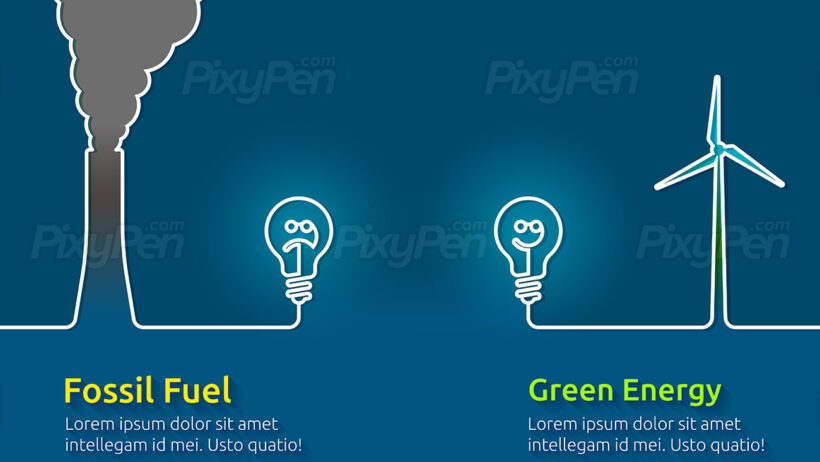As we navigate through the 21st century, the undeniable impacts of climate change become increasingly apparent. The escalating prevalence of natural disasters, unpredictable weather patterns, and rising sea levels serve as stark reminders of our planet’s deteriorating health. Among the most pivotal contributors to this predicament are fossil fuels. Transitioning from fossil fuels to renewable energy sources is not just an option; it is an imperative. This discourse unfolds the critical reasons why renewable energy is the linchpin in our pursuit of a cooler, sustainable planet.
To begin with, it is essential to delineate the various types of renewable energy sources that are gaining traction globally. Solar energy harnesses the abundant rays of the sun, utilizing photovoltaic cells to convert sunlight into electricity. Wind energy, on the other hand, exploits the kinetic energy generated by wind currents, employing turbines to generate electrical power. Hydroelectric power capitalizes on flowing water, converting the energy from rivers and streams into electricity. Other notable renewable sources include geothermal energy, which taps into the Earth’s internal heat, and biomass energy derived from organic materials. Each of these sources presents a viable alternative to fossil fuels, creating a diverse portfolio of options for sustainable energy production.
The environmental advantages of renewable energy are profound. The combustion of fossil fuels releases copious amounts of carbon dioxide and other greenhouse gases into the atmosphere, exacerbating global warming. In stark contrast, renewable energy sources emit little to no greenhouse gases during operation. Transitioning to renewable energy could significantly reduce our carbon footprint, thereby mitigating the effects of climate change. This fundamental shift not only safeguards ecosystems but also contributes to biodiversity conservation by minimizing habitat destruction associated with fossil fuel extraction.
Moreover, renewable energy offers a plethora of health benefits. Fossil fuel combustion generates air pollutants that can cause respiratory diseases, cardiovascular issues, and premature deaths. Communities situated near coal mines or oil drilling sites experience higher incidences of these health problems. In contrast, renewable energy technologies generally produce cleaner air, leading to improved public health outcomes. By prioritizing renewable energy, we are investing in a healthier future for all, especially for vulnerable populations disproportionately affected by pollution.
Economic implications also play a vital role in this discourse. While historically, fossil fuels have dominated the energy market, the tide is turning. The cost of renewable energy technologies has plummeted dramatically over the past decade, making solar and wind power not only feasible but often cheaper than their fossil fuel counterparts. This economic shift has led to job creation in the renewable energy sector, providing employment opportunities in manufacturing, installation, and maintenance. The growth of this sector promises a diversification of local economies, particularly in regions that have traditionally relied on fossil fuels.
The geographical advantages of renewable energy sources further bolster their viability. Fossil fuels are often concentrated in particular regions, leading to geopolitical tensions and energy insecurity. Conversely, renewable energy can be harnessed almost anywhere, from vast deserts ideal for solar farms to windy plains perfect for wind turbines. This decentralization of energy production enhances energy independence and resilience, reducing reliance on foreign oil and promoting local energy security.
In terms of scalability, renewable energy systems can be adapted to meet various needs, from small-scale home installations to large utility-scale projects. This flexibility allows for a tailored approach to energy generation, accommodating diverse energy demands and promoting community engagement. Larger systems can feed electricity into the grid, while smaller systems can empower off-grid communities, providing electricity in remote areas where traditional grid access is limited.
Despite these advantages, challenges remain in the transition to renewable energy. Intermittency issues related to solar and wind energy require innovative solutions to ensure a stable energy supply. Energy storage technologies, such as batteries and pumped hydro storage, are becoming increasingly important, allowing excess energy to be stored and utilized as needed. Additionally, upgrading and expanding grid infrastructure is necessary to accommodate the influx of renewable energy sources, ensuring efficient distribution and access.
Policymakers play a crucial role in this transition. Governments must implement supportive regulatory frameworks that incentivize investment in renewable energy technologies. Subsidies for fossil fuels must be re-evaluated, redirecting funds towards renewable projects. International agreements, such as the Paris Agreement, underscore the importance of collective action in combating climate change. These frameworks encourage nations to commit to reducing greenhouse gas emissions and transitioning towards cleaner energy sources.
Public awareness and engagement are pivotal in driving the transition to renewable energy. Education campaigns can empower individuals to demand sustainable practices from corporations and governments alike. Grassroots movements advocating for renewable energy initiatives can create significant pressure to catalyze change at local and national levels. However, the philosophical shift in society’s perception of energy usage and responsibility is paramount; recognizing energy consumption as an ethical consideration will help foster a culture of sustainability.
In conclusion, the transition from fossil fuels to renewable energy is not merely a technical challenge but a holistic necessity. The multifaceted benefits of renewable energy—from environmental conservation and health improvements to economic growth and energy independence—are too significant to ignore. As we stand on the precipice of possible change, it is incumbent upon us to advocate for policies and practices that facilitate this transition. By embracing renewable energy, we are not just reducing our carbon footprint; we are ensuring the viability of our planet for generations to come.








